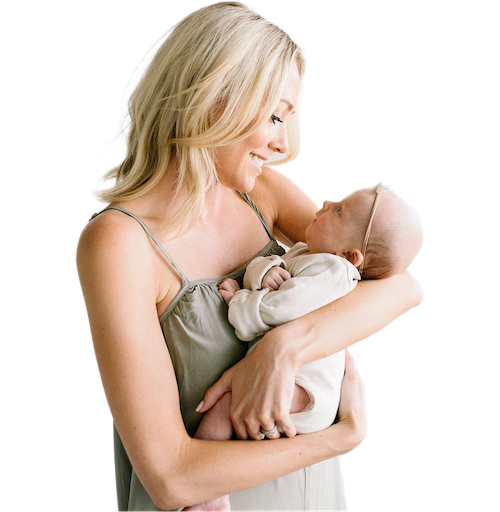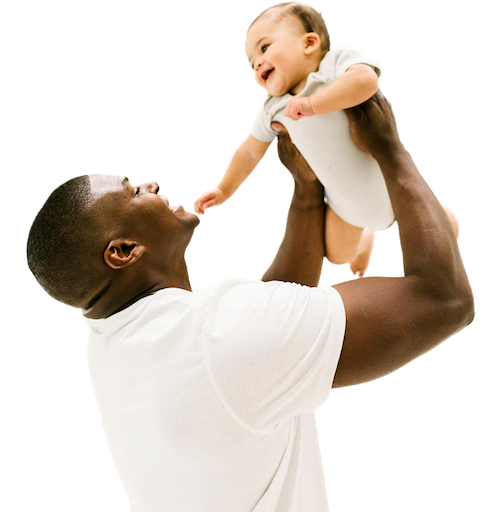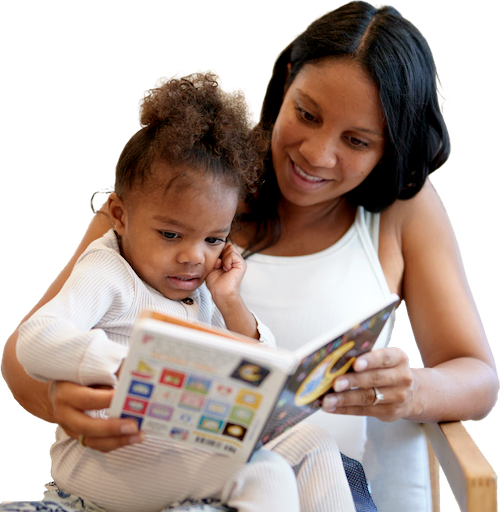I want to tell you about my journey with sleep training. My entire life, more than anything else in this world, I wanted to be a mom. That’s what I wanted. My heart’s desire was to be a mom. And then, I had Ella.
Here I am, a baby nurse; her dad is a pediatrician. Wouldn’t you assume we’d be incredible? We thought “How hard can it be? We’re good at taking care of babies!”
As a doctor and nurse, we knew the importance of baby sleep. We know how vital sleep is for a baby’s development.
Let me share with you some of the benefits of sleep for babies and toddlers:anchor
1. Sleep helps our babies’ brains mature(1) and lays the foundation for consolidating memories.
2. Research(2) proves that babies who have more consolidated nighttime sleep actually have higher cognitive scores.
3. Babies who sleep at night have been found to have an “easier” temperament, being more approachable, less distractible, and more adaptable.(3)
4. Good sleep is an important part of children’s mental and physical health.(8, 9, 10, 11)
These are just a few of the reasons. Sleep is just so important for all of us and impacts every aspect of our development, mood, and life in general.
I knew sleep was important, but let me tell you my story and show you my heart:anchor
Let me recap what I discovered: We got Ella sleeping and it was LIFE-CHANGING! Sleep was the answer for Ella; she was a happy, bonded baby. Sleep was the answer for me; I was able to be the mom Ella needed. Sleep was the answer for my relationship. We were on the same page again. Let me show you what research shows about sleep training:
Sleep training works. Even if there is crying involved, the benefits of sleep are so important.
In fact, this research(4) reviews 52 treatment studies. These studies show that sleep training “produces reliable and durable changes in bedtime problems and night wakings in infants and young children. An overwhelming majority of children respond favorably to these behavioral techniques, resulting in not only better sleep, but also improvements in child and family well-being.”
Let me break it down a little more. That review of the research tells us that sleep training works. It tells us that it helps babies sleep better, that they do well with sleep training, and that all of this improves the well-being of the entire family. (12, 13)
Now, maybe you are like me and you are reading this and thinking “Sure, Cara. This sounds great on paper, but my heart is still unsure.” I felt the same way.
I need you to hear this:
Research(5) shows that sleep training doesn’t harm attachment.
Lack of sleep is stressful on our bodies. Cortisol is higher when we aren’t sleeping. After sleep training, a baby's cortisol levels are actually lower because sleep deprivation and interrupted sleep are stressful on our bodies, our brains, and our emotions.
I want to tell you we got Ella sleeping. It was life-changing. I know I’m not the only one. I want you to see this research(6) on maternal stress levels.
Maternal stress moderately decreased over the first month of sleep training. Infant stress, measured by salivary cortisol levels, was slightly lower in the infants in the sleep training groups. The security of child-parent attachment was not different among the sleep training or non-sleep training groups.
Moms who had babies who were sleeping well were experiencing less stress and anxiety, babies who were sleeping well experienced less stress, and families who used sleep training didn’t show any difference in their security and attachment. When babies sleep well, it benefits the entire family.(12, 13)
I want you to know that everything I do and everything that I teach is based on evidence-based practices.
For my family and for so many families that I’ve worked with, sleep training is life-changing. That is why I created The 5–24 Month Collection. It includes the ABCs of Sleep, Conquering Naps, and Bumps Along the Way. Will you see what these parents have to say?


Now, I want to acknowledge that sleep training isn’t for every family. That’s ok if it’s not for your family. Please know my Will I Ever Sleep Again? and Navigating Months 3 & 4 do not include any sleep training and can still be a great fit for you if your baby is under 5 months.
If you need help, I’m here. I would love to help you through my classes. If you’ve taken a class, please know that my team is happy to help through our phone consults. You don’t have to do this alone.
References
13 Sources
Tarullo et al. (2011). Sleep and infant learning.
Scher, A. (2005).Infant sleep at 10 months of age as a window to cognitive development.
Spruyt et al. (2007). Relationship between sleep/wake patterns, temperament and overall development in term infants over the first year of life.
Mindell et al. (2006). Behavioral Treatment of Bedtime Problems and Night Wakings in Infants and Young Children.
Shaughnessy, A. (2016). Getting an Infant to Sleep: Graduated Extinction and Sleep Fading Are Effective.
Symon et al. (2012). Reducing postnatal depression, anxiety and stress using an infant sleep intervention.
Blunden, S. et al. (2022). Do responsive sleep interventions impact mental health in mother/infant dyads compared to extinction interventions? A pilot study
Horiuchi, F. et al. (2021). Mental health and sleep habits/problems in children aged 3–4 years: a population study.
Chaput, JP., Gray, C.E., Poitras, V.J. et al. (2017). Systematic review of the relationships between sleep duration and health indicators in the early years (0–4 years).
Tomisaki, E., Tanaka, E., Watanabe, T. et al. (2018). The relationship between the development of social competence and sleep in infants: a longitudinal study.
Besedovsky, L., Lange, T. & Born, J. (2012). Sleep and immune function.
King, L. et al. (2019). Mothers’ postpartum sleep disturbance is associated with the ability to sustain sensitivity toward infants,
Wilson SJ, et al. (2017). Shortened sleep fuels inflammatory responses to marital conflict: Emotion regulation matters.
Keep in mind that the information and content on this blog is for informational purposes and should not be considered medical advice. If you have questions about your child, please reach out to your doctor.












